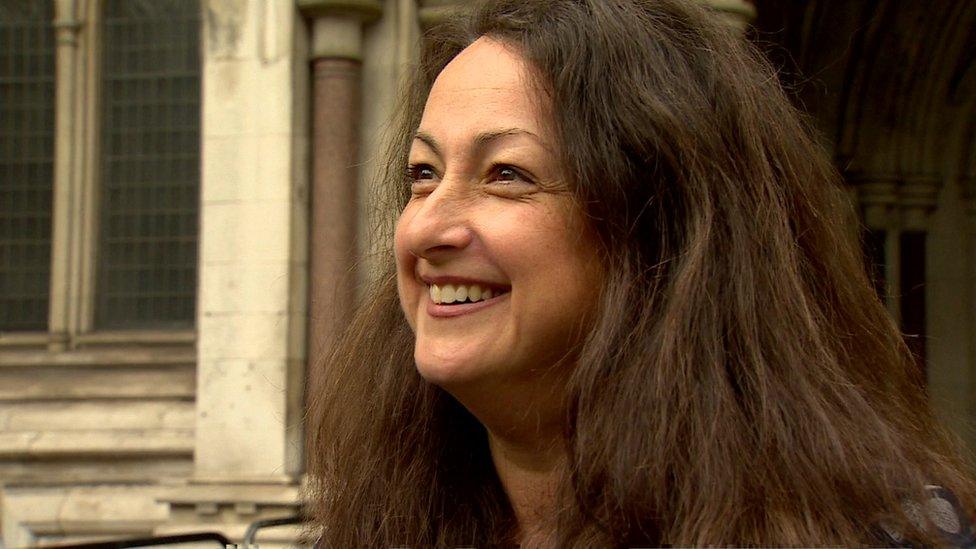The widow, the judge and the frozen embryos
- Published

Samantha Jefferies outside the High Court
Samantha Jefferies walked out of court wearing a broad smile and with the certainty that she can now have a final round of fertility treatment using embryos created with her late husband.
The court ruling means the embryos - created in 2013 - can be stored until 2023.
It will be 10 years since they were created - the maximum period allowed under the law.
The case arose after her husband Clive - who served in the Falklands War - died suddenly and unexpectedly in 2014.
He had signed forms saying that any embryos created could be used after his death, and gave permission for them to be stored for 10 years.
NHS funding
But somehow - and who did this remains unclear - the consent forms were amended to reduce the storage to just two years, a period that has since expired.
Lawyers for Mrs Jefferies said the clinic had a policy at the time - since changed - to offer storage only for the period in which it had funding.
The couple had their treatment funded by the NHS and this had a two-year time limit.
So, after Clive Jefferies' death, there was no way of extending his consent for storage and the clinic wrote to his widow saying the embryos must be destroyed.
And this is the reason why the case ended up in court.
The clinic backed Mrs Jefferies' case and paid her legal costs.
The Human Fertilisation and Embryology Authority, which regulates clinics, also supported Mrs Jefferies, even though it was the body supposedly defending the case because it has to apply the letter of the law.
So this created the unusual situation when all sides in court wanted the claimant to win.
The president of the Family Division of the High Court, Sir James Munby, who heard the case, also made it very clear where his sympathies lay.
He said it was important that consent forms were filled in correctly but there "may be scope for escaping the consequences of faulty documentation".
The case - which had been set down for two days - lasted just two hours.
No-one seemed sure who amended the consent forms. There was talk of a handwriting expert being called but it was not required.
'Common sense'
Sir James will give his full judgement in a few days but he said it was "obviously right" that the embryos should be stored for the full 10 years.
He also apologised that Mrs Jefferies had ended up in court as a result of "the mistakes of others".
Outside court, Mrs Jefferies said she was delighted that "common sense" had prevailed and she praised the compassion shown by the judge and all parties to the case.
She told me: "I am 100% confident that Clive would have wanted our embryos stored and for me to use them to be a mum.
"I hope no-one else has to go through this, and it gives confidence to others who want to challenge a decision."
It's unclear whether there are wider implications for this case - for that we must wait for the full judgement.
James Lawford Davies of Hempsons solicitors, who represented Mrs Jefferies, said: "I am delighted for Samantha, though it's unfortunate that she had to go to court to fight for the right to use these embryos in circumstances where nobody questioned Clive's desire for her to be allowed to use them after his death.
"The rules relating to consent in IVF are extremely complex and, in light of the number of cases which have resulted in litigation, it is time for them to be reviewed to make the process more straightforward for both patients and clinics."
- Published28 September 2016
- Published20 June 2016
- Published20 June 2016